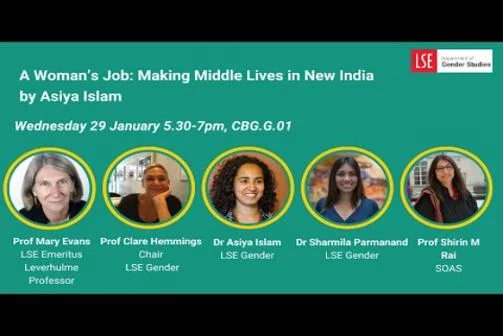Dr Asiya Islam

About
Dr Asiya Islam is Assistant Professor in Gender, Development and Globalisation.
She is broadly interested in the relationship between gender and work, in other words, in understanding how gender and work mutually shape each other. She asks questions like – What are the processes through which work and workers are gendered? How are gender relations and inequalities reproduced and challenged in emerging forms of work? What are the lived experiences of the promise of empowerment through work? In studying work, she closely interrogates the definition, classification, and value of work; as such, her research includes under- and un-paid forms of work, such as domestic work, care work, as well as the work of preparing for work. She adopts an intersectional approach to gender and has particularly been attentive to the intersections between gender, class, and caste in her research. Her expertise is in ethnographic research, and she is interested in further developing critical and creative feminist approaches to ethnography.
One of her research projects is a longitudinal ethnography with young lower middle class women in Delhi, India. She has mapped young women’s entry into service work, their intermittent exit to pursue skills training and higher education, as well as to participate in domestic and status production work, and their recent forays into digital work. This research, which presents a nuanced picture of women’s working lives amidst discussions of low rate of women's participation in the workforce in India, is the basis of her recent monograph A Woman’s Job: Making Middle Lives in Urban India (Cambridge University Press).
More recently, she has been researching gender inequalities in and gendered shaping of digital work. This has included research on the ‘gender digital divide’ in India, how women establish work rhythms and worker subjectivities when working-from-home (funded by the British Academy), and working lives of women in platform delivery work in Delhi, India and Buenos Aires, Argentina. This work uses critical decolonial feminist approaches to intervene in emerging scholarship of digital futures of work, including through a strategic focus on the Global South.
She is interested in the ‘backend’ work required for the development of artificial intelligence, largely outsourced to vulnerable workers in the Global South, often in the name of (digital) empowerment. She is now developing a project to critically examine this work in Argentina, India, and South Africa.
She is a member of the Feminist Review editorial collective, associate editor for New Technology, Work and Employment, and an editor for the ethnographic storytelling magazine Otherwise.
Prior to joining LSE Gender Studies, she was a Lecturer in Gender and Work at the University of Leeds. Before that, she was a Junior Research Fellow at Newnham College, University of Cambridge. In these positions, she taught on feminist global political economy, Black feminist theory, and intersectionality.
She completed her PhD in Sociology at the University of Cambridge, MSc in Gender, Media and Culture at the London School of Economics, and BA(Hons) Communicative English at Aligarh Muslim University.
Expertise
Gender, class, youth, work, Global South, development and globalisation
